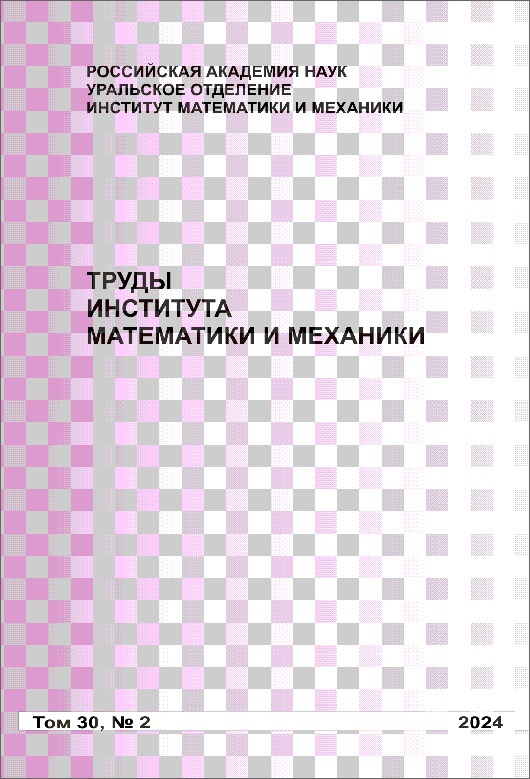|
Multivariate version of Turan’s type inequality and its applications to the estimation of uniform moduli of smoothness of periodic functions
N. A. Ilyasov
Baku State University
Abstract:
The following results are proved in the paper.
Theorem 1. Let m⩾1, f∈L1(Tm), l,k∈N, l>m, ρ=l−(k+m), and ∑∞n=1nm−1ωl(f;d/n)1,m<∞. Then f is equivalent to some function ψ∈C(Tm) and
(a) ωk(ψ;dn)∞,m⩽C1(k,l,m){∞∑ν=n+1νm−1ωl(f;dν)1,m+χ(ρ)n−kn∑ν=1νk+m−1ωl(f;dν)1,m},n∈N,
where ωl(f;δ)1,m is the l th-order complete modulus of smoothness of f, ωk(ψ;δ)∞,m is the k th-order complete modulus of smoothness of ψ, Tm=(−π,π]m, d=πm1/2, χ(t)=0 for t⩽0, and χ(t)=1 for t>0.
In the case l=k+m (⇒χ(ρ)=0), the proof of estimate (a) relies substantially on the inequality
(b) n−kmax|α|=k‖∂|α|Tn,…,n;1(f;x)∂xα‖∞,m⩽C2(k,m)nmωk+m(f;dn+1)1,m,n∈N,
where Tn,…,n;1(f;x1,…,xm) is a polynomial of best L1(Tm)-approximation to f of order n∈N with respect to the variable xi (i=¯1,m) and α=(α1,…,αm), αj∈Z+ (j=¯1,m), is a multiindex of length |α|=k. Inequality (b) is proved by using a multivariate version of Turan's type inequality: for each trigonometric polynomial tn1,…,nm(x1,…,xm) of order ni∈N with respect to the variable xi (i=¯1,m), we have the inequality
(c) ‖∂ktn1,…,nm(x)∂xα‖∞,m⩽(π2)m‖∂k+mtn1,…,nm(x1,…,xm)∂xα1+11…∂xαm+1m‖1,m,
which follows directly from a similar inequality (with k=0 in inequality (c)) but holds under the conditions
12π∫2π0tn1,…,ni,…,nm(x1,…,xi−yi,…,xm)dyi=0, i=¯1,m.
Estimate (a) is order-sharp in the class Hl1,m[ω]={f∈L1(Tm): ωl(f;δ)1,m⩽ω(δ), δ∈(0,d]}, where ω∈Ωl(0,d] is the class of functions ω=ω(δ) defined on (0,d] and satisfying the conditions 0<ω(δ)↓0 (δ↓0) and δ−lω(δ)↓(δ↑).
Theorem 2. Let m⩾1, l,k∈N, l>m, ρ=l−(k+m), ω∈Ωl(0,d], and ∑∞n=1nm−1ω(d/n)<∞. Then
sup{ωk(ψ;dn)∞,m: f∈Hl1,m[ω]}≍∞∑ν=n+1νm−1ω(dν)+χ(ρ)n−kn∑ν=1νk+m−1ω(dν),n∈N,
where ψ is the corresponding function from the class C(Tm) equivalent to f∈Hl1,m[ω].
Keywords:
complete modulus of smoothness, multivariate version of Turan's type inequality, inequalities between moduli of smoothness of various order in different metrics, order-sharp inequality on a class.
Received: 18.03.2019
Citation:
N. A. Ilyasov, “Multivariate version of Turan’s type inequality and its applications to the estimation of uniform moduli of smoothness of periodic functions”, Trudy Inst. Mat. i Mekh. UrO RAN, 25, no. 2, 2019, 102–115
Linking options:
https://www.mathnet.ru/eng/timm1627 https://www.mathnet.ru/eng/timm/v25/i2/p102
|

| Statistics & downloads: |
| Abstract page: | 311 | | Full-text PDF : | 104 | | References: | 59 | | First page: | 39 |
|




 Contact us:
Contact us: Terms of Use
Terms of Use
 Registration to the website
Registration to the website Logotypes
Logotypes









 Citation in format
Citation in format 